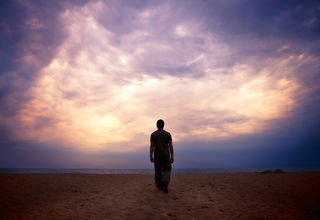Friends
The Power of Asking for Help
We need all the help we can get. Here's why to ask for it.
Posted January 6, 2016
“Friend.......Good”
—Frankenstein
I used to belong to a Board of Advisors for a neighbor of mine, a computer software designer who wanted to move into the construction business and wanted help making that career transition.
He asked half a dozen people to get together at his house quarterly, and the first order of business was that he fed us expensive ice cream. Then we retired to his dining room table for several hours and we asked him questions, gave him feedback, and gave him homework. I was so impressed by the progress he made in less than a year that I created a Board of Advisors for myself.
Some people call these “dream teams,” and they’re a terrific demonstration of the role community can play in the unfolding of an individual's sense of purpose and passion, and an embodiment of a famous experiment conducted in the 1960’s by psychologist Stanley Milgram, called the Small World Experiment, which introduced into the language the term “six degrees of separation.”
It showed that any two strangers in the U.S. could be connected to one another through no more than six intermediaries. In other words, if you picked someone’s name randomly out of the phone book for, say, Hoboken, New Jersey, and then gathered six people together in a room, one of those people would know someone who knew someone who knew that person in Hoboken.
I mention this because we need all the help we can get turning the no's in our lives into yeses, and we often sorely underestimate the power contained within even a small circle of friends.

The rub is that you’ve got to be willing to ask for help, and that can be daunting because it requires that you lower the drawbridge and admit that you need help. And this is especially difficult for anyone who runs their own ship, is in a position of leadership, is self-employed, or who happens to have been born a man. Because the sort of vulnerability required to ask for help is generally bred out of us at a pretty early age.
I read a magazine article recently, written by a waiter in a restaurant in midtown Manhattan, and he said that men who are choking in restaurants will sometimes, out of pride, hide in the bathroom, where they’ll die because they can’t get help. To say nothing of the men who won’t even make it to the bathroom because they don’t know where it is, and men, of course, would rather die than ask for directions.
The refusal to ask for help is a kind of arrogance, a blind insistence on doing it all by yourself no matter what, because along with it comes the message that no one’s help is worth the price in vulnerability it will cost you, that ultimately no one can console you or ease your pain, and no one is that strong if you yourself aren’t. Such cussedness betrays a tremendous lack of faith in others, in the tensile strength of love and friendship, and in your own ability to survive embarrassment. Resourceful people, however, gather their resources and join forces.
The naturalist Milton Olsen once observed that when geese travel the blue lanes of sky on their migrations, each bird flapping its wings creates an uplift for the bird behind it, and by flying in V-formation the whole flock gets over 70% better mileage than if each bird flew solo. When the lead bird, which doesn’t benefit from these physics of cooperation, gets tired, it rotates to the back and a new lead bird takes over. If any goose falls out of formation it is quickly reminded of the dynamics of drag and the importance of getting a little help from its friends.
Among people, the refusal to seek help is not rugged individualism; it’s ragged individualism, and it’s a function of fear. Not that there’s nothing to fear. Asking for help requires not only the admission that you need help—which takes either some guts or enough desperation that you don’t care anymore what other people think—but also the willingness to allow those people some say in your personal affairs, which inevitably triggers the fear of falling into the hands of numbskulls, petty tyrants and control freaks.
More than a few of us have burrs under our saddles when it comes to granting others the opportunity to help us or guide us, knowing how easily people fall to acting like amateur preachers and psychotherapists, trying to heal, convert and fix, imagining themselves the instruments of our deliverance and the answers to our prayers—in a sense blocking your view of God by pretending to be God.
For this reason, anyone seeking help needs a working set of green lights and red lights, a sense of where others leave off and you begin. And ultimately nobody can tell you what’s right for you, any more than they can tell you what your dreams mean.
Good help is indeed hard to find, but the best help, I think, is the beneficent influence of anyone who, in being authentic to their own selves and struggling with their own conundrums, has come to know the power of asking for help and forging alliances. Such people provide us with the been-there factor, which enables them to empathize, understand the challenges involved, and offer experiential rather than just expert advice, which often knows only what can’t be done.
Anyone, however, who is good at taking corners is a worthy ally; people in the “helping professions” who specialize in making transitions and rites of passage; change-agents who are versed in responding to obstacles and helping others manage the discomforts provoked by attempts to reveal the truth to themselves; and anyone whose forte is holding hands. This includes therapists and counselors, ministers and healers, teachers, psychics, swamis and social workers, or simply anyone who understands that the biggest part of helping is often just heartfulness.
“Once, I thought anyone with enthusiasm about information was a good teacher,” the writer Toni Cade Bambara once said. “Then anyone who could help me decide how to put my wrath to service. Later, anyone who could lead me back to ancient wisdoms. More recently, anyone who could increase my understanding of all the forces afoot in the universe was a teacher. I now have more simplistic criteria: anyone with a greater capacity for love than I is a valuable teacher.”
Whoever you rally to help you in your endeavors, though, they will automatically have one thing going for them that you don’t have, and that is simply that they’re not you. They’re not in your head or your shoes or the same thicket of knots into which you’ve tied yourself with your endless deliberations about what to do and whether to do it.
They possess that elixir called perspective, one of the characteristics of which is distance. The closer you are to a thing, that is, the more you're entangled in its intricacies and the less you truly see of it, and this goes as much for your personal dilemmas as for a painting in progress (which explains why ancient Italian cities used to seek judges from other places, who weren't ensnarled in the local affairs).
There's one more challenge to asking for help, though, and it might be the thorniest. Asking for help is an admission that you’re ready for action, prepared to put your dreams to the test, and that is moth-to-the-flame stuff. The trouble with asking for help, in other words, is that you may get it!
To find out more about Passion!, visit www.gregglevoy.com




